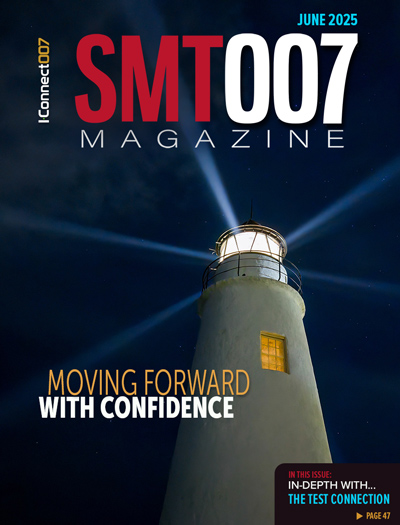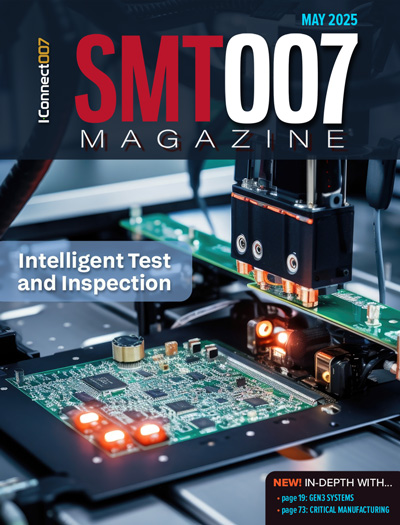-

-
News
News Highlights
- Books
Featured Books
- smt007 Magazine
Latest Issues
Current Issue
What's Your Sweet Spot?
Are you in a niche that’s growing or shrinking? Is it time to reassess and refocus? We spotlight companies thriving by redefining or reinforcing their niche. What are their insights?

Moving Forward With Confidence
In this issue, we focus on sales and quoting, workforce training, new IPC leadership in the U.S. and Canada, the effects of tariffs, CFX standards, and much more—all designed to provide perspective as you move through the cloud bank of today's shifting economic market.

Intelligent Test and Inspection
Are you ready to explore the cutting-edge advancements shaping the electronics manufacturing industry? The May 2025 issue of SMT007 Magazine is packed with insights, innovations, and expert perspectives that you won’t want to miss.
- Articles
- Columns
- Links
- Media kit
||| MENU - smt007 Magazine
Estimated reading time: 5 minutes
Contact Columnist Form
Millennials in Manufacturing: Hiring, Training and Retaining Millennials
Shelly Phelps is the human resource manager at Saline Lectronics, where she manages recruitment strategies, disciplinary actions, and employee relations. Her role at the company also includes providing redirection for possible resolutions during communication breakdowns, interpersonal employee conflicts, and coaching opportunities with the management team.
In this interview, she discusses the greatest challenges when dealing with millennials, and how she thinks management and training should evolve for a more effective onboarding of this new generation of manufacturing workforce.
Davina McDonnell: What are some of your greatest challenges when managing and leading millennials?
Shelly Phelps: A few challenges I have noticed when dealing with the millennial generation are high expectations, low patience, and struggle when technology is limited or restricted. This generation grew up with rapid change of computer access and all forms of technology. They prefer and expect rapid change when processes do not work. They have little tolerance and patience for changes that are delayed for long durations. They would prefer to streamline and speed up the process of learning their job and don’t seem to embrace putting your time in for “moving up the ladder.” Most millennial employees have significant difficulty in going for long periods of time being disconnected from their cell phones. A majority of the violations of our cell phone policy are from the millennial generation, although not all.
McDonnell: With the increasing number of millennials joining the manufacturing industry, how do you see the evolution of the way you manage and/or train your team?
Phelps: I see that millennials like a challenge, especially if you engage them in a specific goal or improving tasks. They like to take ownership in the progress. They like to be engaged, and they get bored easily. The hands-on training seems to work well for millennials, if sufficient time is allowed. However, the written trainings seem to pose an issue. Reading multiple documents posted on the company server, without any way to verify if they understand them, seems to leave major gaps. We need to revise our method of training.
McDonnell: Some analysts say that millennials have a difficult time being loyal to one company for very long. Do you find that to be true?
Phelps: Actually, the loyalty issue is not isolated to the millennials. I am seeing that the lack of loyalty is not generation specific. The days where employees stay at one company for many years seem to be fading due to competitive wages and finding many other opportunities where skills can be transferred to other jobs.
McDonnell: Do you think companies need to have a new set of engagement policies to accommodate the millennial generation?
Phelps: Absolutely, we do need to find new and innovative engagement policies for millennials. This generation is not in favor of sitting around a table and discussing change. They would be more interested in “working meetings” where the task is in front of them and they are actively collaborating and making changes at the same time.
McDonnell: What unique challenges do you find in training or managing millennials?
Phelps: The most unique challenge is finding ways to constantly motivate millennials. It appears their motivation and drive seems to fade quickly. It is difficult to get them engaged and maintain full engagement. Because this generation is tech savvy, training documents where millennials need to spend a great deal of time reading on a computer or in printed format doesn’t seem to be effective with retaining information. However, if we had a training program that included an app on their cell phones with some interactive questions to ensure understanding, I believe we would see a drastic improvement with effectiveness in training.
McDonnell: How do you inspire millennials to strive more and perform better?
Phelps: I encourage millennials to present their ideas to their leads or management. They will be the upcoming experts and we need to listen to their fresh new ideas that promote change for improvements to stay competitive. I also impress upon them that there are always opportunities to grow and look for them. I encourage them to speak up with sharing their thoughts and ideas. I inspire millennials to work with other teams and learn as much as they can because you never know where all the accumulation of knowledge will take them. No one can ever take away what they have learned.
McDonnell: What advantages are you finding that millennials bring to the table?
Phelps: Millennials are tech-savvy and grew up when technology exploded with fast-paced changes, which in our industry is a huge plus. They can help us stay innovative with new ideas that the older generation never thought possible. They are more open-minded to possibilities. They embrace change, and therefore, they look for fast and constant improvements. They seem more willing to work in groups and communicate constantly. They want to be challenged and are not willing to settle for the adage “that’s how we have always done it.” They want to be engaged with process improvements and implement them quickly, which will help us stay competitive.
McDonnell: The older generation will eventually vacate many leadership positions. Do you think millennials have the patience and perseverance to become leaders?
Phelps: Yes, there are coaching opportunities available to show them the benefits of patience to persevere in the long run. Strategies can be taught to create understanding with the rationale behind the decision-making process. If we implement succession planning now, they will be ready and we could increase their patience and perseverance to become great and successful leaders. They prefer less aggressive leadership styles and embrace more of the coaching leadership types.
McDonnell: How do you attract millennials to join the company?
Phelps: We actually do not target millennials specifically. However, they do seem to gravitate to our manufacturing facility. We offer opportunities for those who are unsure or sure of their career paths with entry level positions and opportunities to grow with the company. For those millennials who are willing to learn about PCB boards and work hard, they seem to do well.
McDonnell: Thank you very much, Shelly.
Phelps: Thank you.
More Columns from Millennials in Manufacturing
Managing Millennials: Lean Champion Jeff Riedel Emphasizes the Importance of MentoringManaging Millennials: Eric Hassen Discusses the Importance of Balance and Clear Communication
Millennials in Manufacturing: Zach Tondreau—Motivating Millennials
Millennials in Manufacturing: Tom Scales—Manufacturing from an IT Perspective
Millennials in Manufacturing: Mya Walton – The Millennials' Advantage in Manufacturing
Millennials in Manufacturing: Andrea Tarhanich - What’s Driving Millennials to Thrive—and Stay—in Manufacturing
Millennials in Manufacturing: Kyle Robertson – A Rewarding Career
Millennials in Manufacturing: Cathy Cox – Multiple Approaches to Solving Problems


